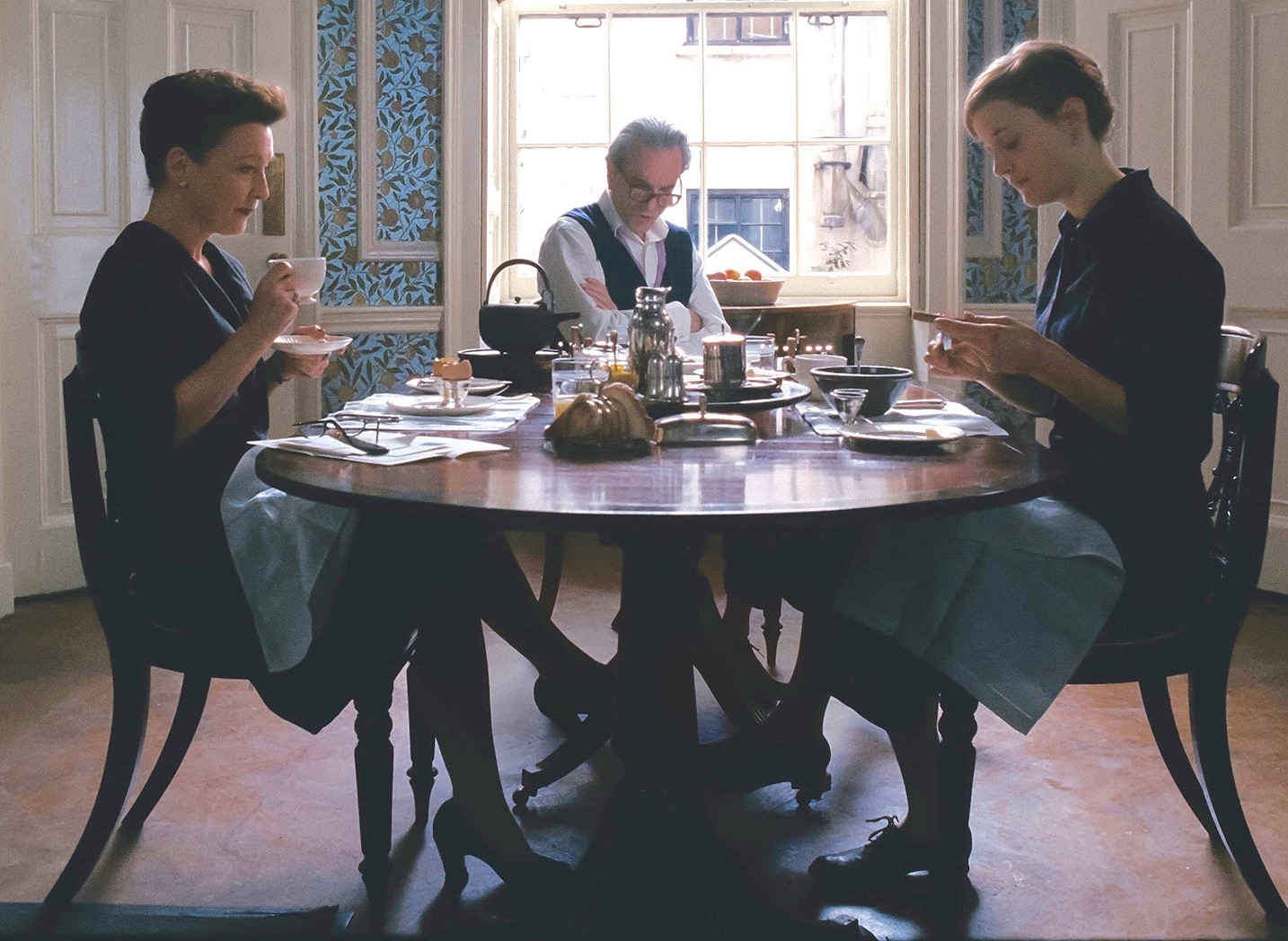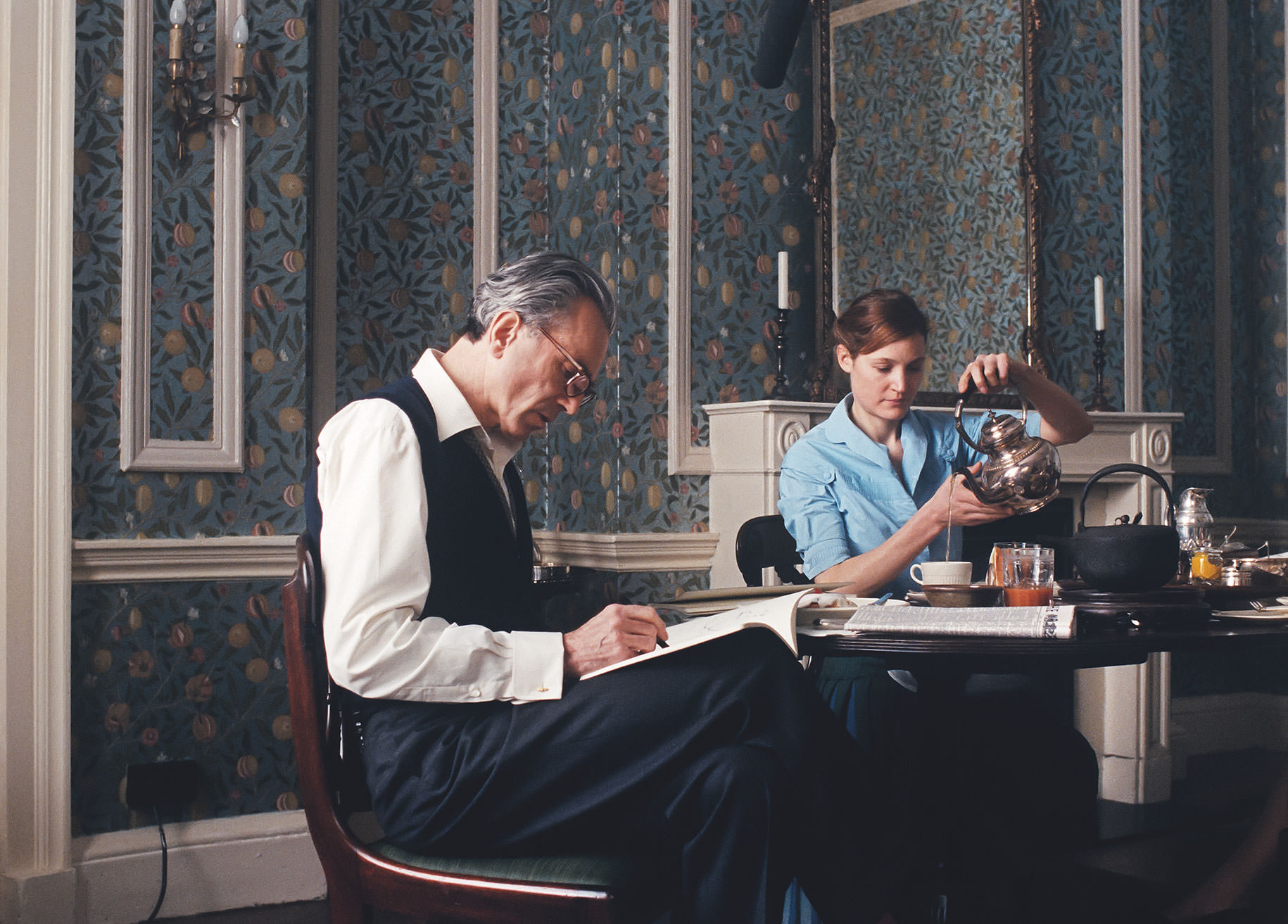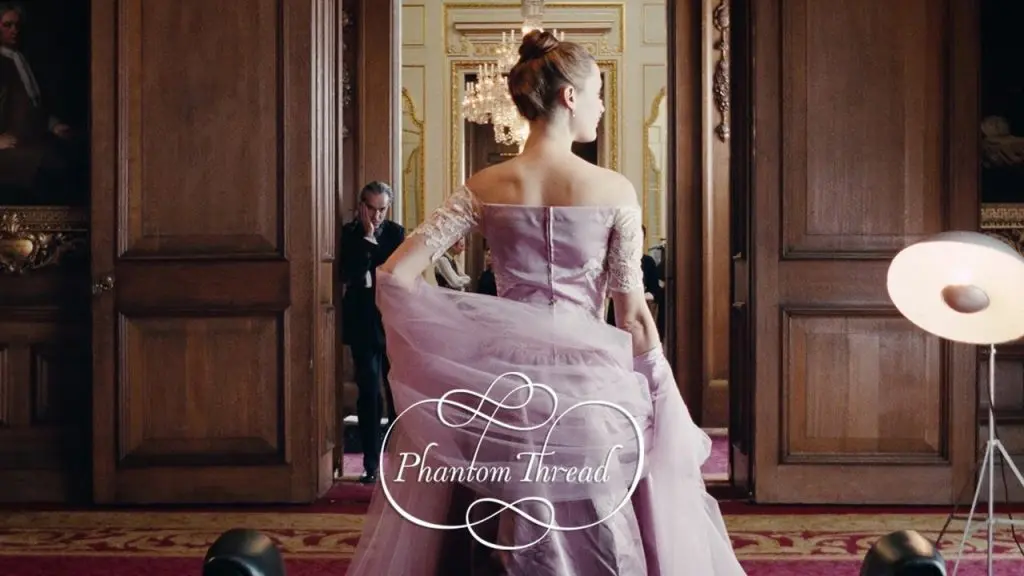In Phantom Thread, writer-director Paul Thomas Anderson and star Daniel Day-Lewis collaborate again for the first time since 2007’s There Will Be Blood to put forth a seamless masterpiece. Rather than the stark, bleak oil fields of the American southwest and the bombastic insanity of Daniel Plainview and Eli Sunday, Anderson ushers us into the couture world of Reynolds Woodcock (Daniel Day-Lewis). Joining him in his fussy life are his sister Cyril (Lesley Manville) and his lover Alma (Vickie Krieps).

In Phantom Thread the most elite fashion designer in 1950s London, Reynolds Woodcock lives a life of isolated fastidiousness. Like the dresses that he makes, his life must unswervingly be ordered according to his routine. Nothing – at all – may be out of place. He is difficult and demanding, but he is the best at what he does, so everyone in his life caters to him, bending to his whims, and ensuring that his will is law. This comes down to not eating too loudly at breakfast, buttering your toast quietly, sipping your tea silently, and not bringing up difficult topics, else his day will be ruined.
Ultimately, the person who both ruins and saves Woodcock’s life in one fell swoop is Alma Elson. He meets her at a restaurant in the countryside and they fall in love. He brings her to London and begins to weave her into his life, letting her work in his studio, and treating her almost as a muse. However, as she begins to settle into life with him, her horrific flaws begin to show. She both butters and eats her toast too loudly, she brings him tea, she wants to cook dinner for him. And worst of all, she cooks his asparagus in butter rather than oil. Appalling.

Woodcock tends toward hyperbole and melodramatic pronouncements. When she makes him the evil, buttered asparagus, he asks her, “Were you sent here to ruin my evening, and possibly my entire life?” He declares that “her arrival has cast a very long shadow” over his life – but it is a shadow that he must decide to live with or cast out.
This leads to what is possibly the most dysfunctional relationship ever. As much as I desperately wish to discuss the finer details of that relationship, you must see this film. I am not a Daniel Day-Lewis acolyte – don’t get me wrong, he’s always been a good actor; I’ve just not loved his roles. However, I absolutely loved him in Phantom Thread, not to mention Vickie Krieps, who possibly surpasses Day-Lewis, demonstrating a subtlety and finesse with moments of silence and just a few words that other actresses would likely misuse.
Lesley Manville’s Cyril is also a vision of prim reservation; her brother’s relationship hatchet-person, breaking up with women for him and organizing his staff. Her supporting actress nomination is a bit of a surprise for me, while Day-Lewis’ isn’t (doesn’t he get nominated every time he acts, like Meryl Streep?). Ultimately, I think Krieps delivers a significantly stronger performance than Manville, not taking away from Manville’s accomplishment.

Furthermore, Anderson’s writing is superb, just as fastidious as his main character, and well-deserving of an Oscar nomination – which he did not receive. Add to that Johnny Greenwood’s beautiful, haunting score comprised mostly of just piano and a few strings, as well as a lavish costume and production design, and you have a symphony of a film.
It took me a week to collect my thoughts for this review. I walked out conflicted and torn, but knowing that, deep down, I loved the film. I talked to people about it, hoping to describe it to them, but I just kept saying, “See it. It’s so strange. But so brilliant.” But isn’t that what Paul Thomas Anderson does? With maybe the exception of Inherent Vice, which I did not care for, each of his films is an off-kilter view into a strange corner of the world, populated with characters who you would probably want to either ruthlessly strangle or deeply pity in real life.
On a completely separate note, this film was not at all what I expected. I watched the trailer and felt supremely uncomfortable. That discomfort made me think twice and feel tense going into the film because I didn’t know what I was getting myself into. Seriously, watch the trailer and tell me it doesn’t look like a Fifty Shades prequel: Alma says to someone off screen, “Reynolds has made my dreams come true, and I have given him what he desires most in return. Every piece of me.” While she says this, Reynolds and Alma go into a bedroom, she tries things on, and then he goes to a peephole and stares maniacally in. I was absolutely certain I was going into a BDSM period piece. Spoiler alert: it’s not.

So, in the end, I really loved Phantom Thread. It depicts the roller coaster that a romantic relationship with an artist must be, while also giving the women surrounding this egomaniac a good deal of agency and strength (though their choices are not always healthy). It’s beautiful, orchestral, darkly funny, with maybe one of the tensest, brilliantly acted scenes I’ve ever witnessed. It has stayed with me, resurfacing from time to time in my thoughts, making me continue to vacillate in my opinion of their relationship. Ultimately, Alma and Reynolds are made for each other, and that’s a truly disturbing thought.




